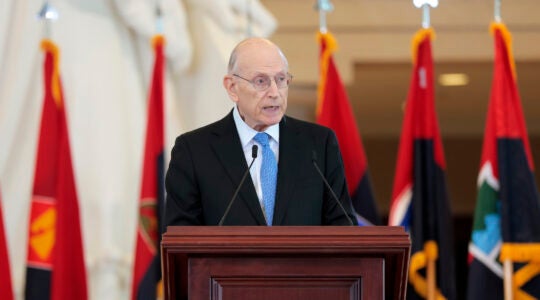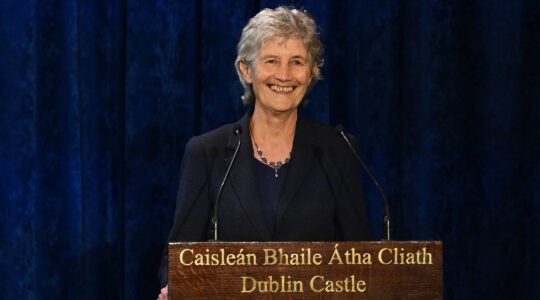LONDON (JTA) — Increased transparency and the inclusion of women’s voices will be cornerstones of the process that Orthodox leaders in Britain have devised to find a replacement for the country’s longtime chief rabbi, Lord Jonathan Sacks, who will step down in September 2013.
Stephen Pack, the president of the United Synagogue, the governing body for 130 Orthodox Jewish communities in Britain, said at a news conference Tuesday that he hopes a new chief rabbi will be found by next September, allowing for a “period of orderly handover.”
Amid speculation that Sacks’ successor may come from overseas, Pack also said that the search committee for the first time would be advertising for the position.
Though the formal search has not yet begun, Pack said that more than a dozen names already comprise an informal shortlist of recommended rabbis. Only about half are Britons.
“If you haven’t advertised, you will find it difficult to say that you’ve done a proper trawl through the UK,” Pack said. “That’s the kind of banana-skin moment we’re trying to avoid.”
Sacks has been Britain’s chief rabbi since 1991 and has used the position to wield tremendous influence over the Jewish world and beyond. A prolific author and frequent commentator on the BBC, he is among the most recognizable and respected religious figures in the country.
Sacks has widened his influence beyond the British Jewish community, authoring a popular translation of the traditional Orthodox prayer book that has been enthusiastically adopted by many communities around the world. Within the United Kingdom, Sacks’ tenure has been marked by a commitment to interfaith efforts and the renewal of community life.
His two decades at the helm haven’t been without controversy. Sacks took over pledging an era of inclusivity, writing in a 1991 book that Orthodox Jews need to attach “positive significance” to the role that liberal Jewish streams have had in keeping identity and practice alive for many Jews.
But several incidents called that commitment into question. In 1997, Sacks withdrew from a memorial service for Rabbi Hugo Gryn, a Reform leader and Holocaust survivor, after protests from the Union of Orthodox Hebrew Congregations. Subsequently it was revealed that in a response to the head of the union, Sacks said Gryn was “among those who destroy the faith.” Sacks also referred to himself as an “enemy” of non-Orthodox movements.
That incident and others have led some to argue that the office of the chief rabbi is unnecessary and that Sacks should be its last occupant. Liberal Jewish leaders have complained that as an Orthodox figure, the chief rabbi is not truly representative of British Jewry.
“The Chief Rabbinate has run its course, and an alternative form of leadership is called for which recognizes the plurality of the community,” wrote Meir Persoff, an expert on Britain’s Chief Rabbinate, in a book titled “Another Way, Another Time?”
The first formal event of the selection process will occur in December when a representative group of about 300 leaders from United Synagogue member communities, as well as delegates from other centrist Orthodox, will convene in London. That group will be asked to sign off on the job description and personal characteristics sought by United Synagogue for the next chief rabbi.
No such group has ever been established to choose a chief rabbi. Other procedural changes Pack announced include the mandated inclusion of women — each synagogue will be represented by its chairman as well as a female member of the board.
Pack said the next chief rabbi may redefine the role somewhat but will not fundamentally change the position.
“We’re not looking for wholesale revolution in the way that it works,” he said.
Though Pack could not divulge specific salary details, he said it is not “ridiculous” to assume it would be comparable to a prime minister’s pay. And Pack acknowledged that it will be difficult to find a replacement for the expansive influence of Sacks.
“What is still the most important thing … is that they appreciate the fact that somebody needs to be a fantastic communicator,” Pack said. “They need to communicate not only on behalf of the Orthodox sector, but they need to communicate on behalf of Anglo Jewry.”
JTA has documented Jewish history in real-time for over a century. Keep our journalism strong by joining us in supporting independent, award-winning reporting.





